In this article:
Breast milk is the primary nutrition source for infants. Moreover, breastfeeding has positive health effects on both the mother and the infant.

The composition of breast milk varies between individuals and over time. It is important for the mother to be mindful of her nutritional intake to help improve the nutritive profile of her breast milk.
The Importance of Breast Milk for a Baby’s Health
Breast milk is the gold standard for infant feeding as it supplies the nutrients and bioactive factors that support and contribute to healthy infant development, growth, and survival. (1)
Breast milk is known for its role in:
- Development of the immune system/function and organs
- Healthy microbial colonization
- Protection against inflammation and infection (1)
Research across the globe has shown that any amount of breast milk can reduce the incidence of gastrointestinal and respiratory infections and the risk of asthma in children who are predisposed, to name a few impressive benefits. (2)
How Long Should One Breastfeed?
Exclusive breastfeeding (EBF) is recommended for the first 6 months of life and supplemental for up to 2 years of life.
Is Breast Milk Uniform Among All Women?
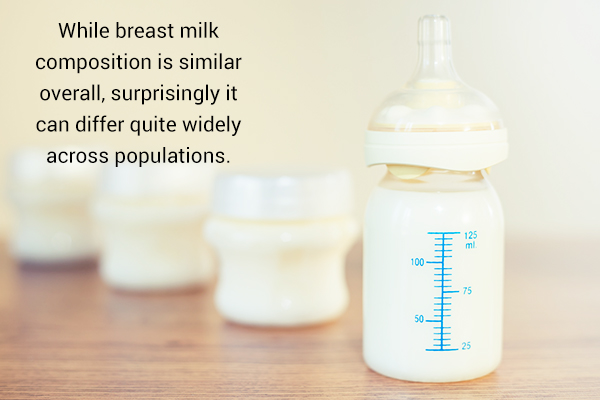
While breast milk composition is similar overall, surprisingly, it can differ quite widely across populations, between mothers, over the stages of lactation, and between individual feedings. (1)
The nutrition in human milk comes from three sources:
- Synthesis in the lactocytes
- Maternal stores
- Mother’s diet
Within the first few hours after birth, or postpartum, colostrum is the first fluid to be produced in the lactation process. While low in volume, it is rich in immunologic and developmental factors.
Colostrum, unlike mature milk, is high in protein, lower in lactose, but higher in sodium, chloride, and magnesium. It also contains antibodies, which help to protect against infection.
Within the next few days postpartum, the production of transitional milk begins where lactose starts to increase, and the ratio of sodium to potassium declines. By 2 weeks postpartum, milk is maturing, and by 4–6 weeks postpartum, milk is deemed to be completely mature.
Mature breast milk provides about 65–70 kcal/dL of energy, which has a high correlation with the fat content of the milk. (1)
Nutrients in Breast Milk
Breast milk contains various necessary nutrients:
1. Protein
Proteins in human milk comprise whey and casein complexes, (3) and levels in milk will decrease within 4–6 weeks postpartum no matter what term the infant is delivered. (4)
The amount of protein in the milk is not affected by the maternal intake of protein, and it increases in mothers who deliver preterm and with the mother’s body weight for height. (1)
2. Milk fat
Milk fat is the most variable nutrient in breast milk. It is found to be lowest in concentration in foremilk (milk at the beginning of feeding) and is highest in concentration in hindmilk (milk at the end of feeding).
Another interesting point regarding the fat content of breast milk is that time of day will also impact content. One study determined that fat content at night and morning feedings was less than that of afternoon and evening feedings. (1)
Fat content, especially that of DHA, is also dependent upon the maternal diet. The main fat sources in breast milk are palmitic and oleic acids. (5)
3. Lactose
Lactose is the predominant sugar in breast milk, and oligosaccharides make up most of the remaining carbohydrates.
Oligosaccharides present in human milk (HMOs) act as prebiotics, which aids in the growth of beneficial probiotics that ultimately influence the colonization of gut microbiota. (6)
4. Growth factors
Breast milk also contains various growth factors that have a vast array of effects on the cardiovascular, nervous, and endocrine systems. (7)
5. Other immunological factors
Other immunological factors (8) that help to protect against inflammation and infection are also found in breast milk.
Advantages of Breastfeeding for Nursing Mothers
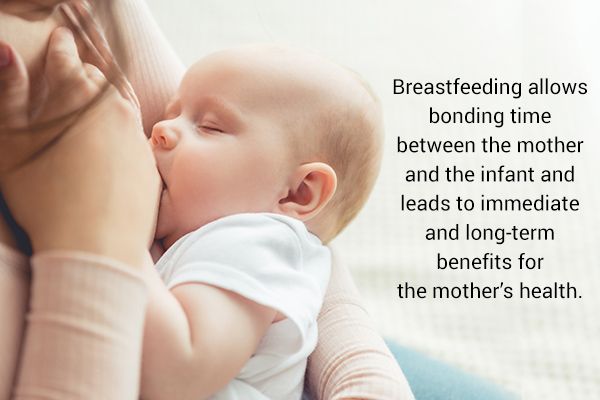
Breastfeeding allows bonding time between the mother and the infant and leads to immediate and long-term benefits for the mother’s health. (9)
Some of the immediate benefits of breastfeeding include:
- Reduced infection and bleeding
- Uterine involution
- Reduced stress and anxiety
- Reduced postpartum depression
- Weight loss
- Improved body image
Breastfeeding has been shown to reduce the risk of the following in the long term:
- Cancer (breast, ovarian, endometrium) and endometriosis
- Osteoporosis
- Cardiovascular diseases and high blood pressure
- Metabolic syndrome and diabetes
- Rheumatoid arthritis
- Multiple sclerosis (MS)
- Alzheimer’s disease
Daily Nourishment for Lactating Mothers
A breastfeeding mother requires additional calories, protein, vitamins, and minerals compared with what she needed before she was pregnant.
For calories, additional needs are estimated at an extra 400 calories daily. However, mothers who are exclusively breastfeeding (EBF) and feeding often will require more calories than a mother who is feeding less or supplementing formula.
Be sure to obtain calories from nutritious sources such as lean proteins, lean dairy, whole grains, fruits, and vegetables.
All in all, the maternal diet should include the following:
- Three servings of low-fat dairy daily to ensure adequate amounts of calcium and vitamin D
- Three servings of fruit and vegetables daily
- Hydration is key to ensuring that the infant gets enough fluids when feeding. A nursing mother should consume about eight 12 oz. servings of fluids daily.
- Juice limited to 8 oz. daily and should be 100% fruit juice
- 7–8 oz. of grains daily, with half or more being whole grains
- 6–7 ounces of protein daily, either from plant or lean animal sources (10)
It is best to consume a well-balanced diet with plenty of decaffeinated fluids to ensure high-nutritive-quality breast milk. Remember that cutting out a food group can result in cutting out specific nutrients.
ALSO READ: 10 Nutritious Foods New Moms Should Eat
Foods That Increase Breast Milk Production
Many factors can influence the milk supply. It is recommended that mothers do not restrict calories to less than 1,500–1,800 calories per day, as this was found to decrease milk production.
A well-balanced maternal diet rich in lean protein, dairy, whole grains, fruits, and vegetables will ensure the macros and vitamins/mineral needs are met.
Are Nuts Beneficial for a Nursing Mother?
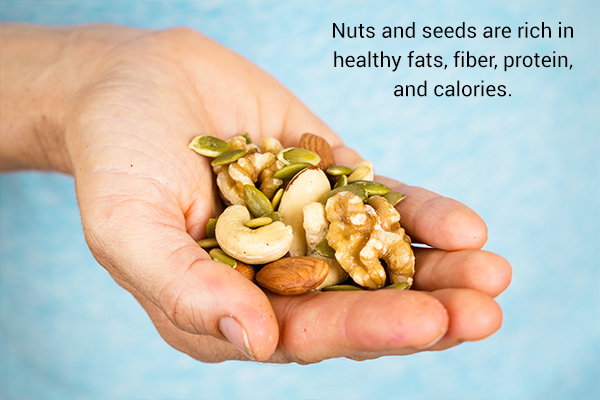
Nuts and seeds are rich in healthy fats, fiber, protein, and calories. Mothers should not be too concerned about passing an allergen from foods they eat through breast milk.
While not common, it is possible that children can have allergic responses during breastfeeding. However, keep in mind that EBF for the first 6 months was shown to have a protective factor against allergy development for infants who have a family history. (1)(2)
Omega-3 Rich Foods for Pregnant and Breastfeeding Women
The typical American diet tends to be higher in omega-6 fatty acids and lacking in omega-3 fatty acids. Food sources high in omega-3 fatty acids are seafood such as salmon, trout, and albacore tuna. (Note that tuna should be limited to 6 oz. per week due to its high mercury content). (11)
Plant sources high in omega-3 fatty acids include Brussels sprouts, kale, flaxseeds, walnuts, canola oil, and spinach. Plant sources require higher consumption than fish sources. (11)
What Vitamins and Minerals Are Important for a Breastfeeding Mother?
Levels of vitamins A, D, B1, B2, B3, B6, and B12, fatty acids, and iodine depend on or are influenced by the maternal diet.
Vitamin K is given at birth for blood clotting to prevent hemorrhage as its level is very low in human milk. Vitamin D is also lower in breast milk, and therefore, supplementation is recommended for postnatal mothers who exclusively breastfeed. (12)
A multivitamin is also recommended for mothers whose diet is not always substantial. (1)(10)
Meat Products That Are Considered Good for New Mothers
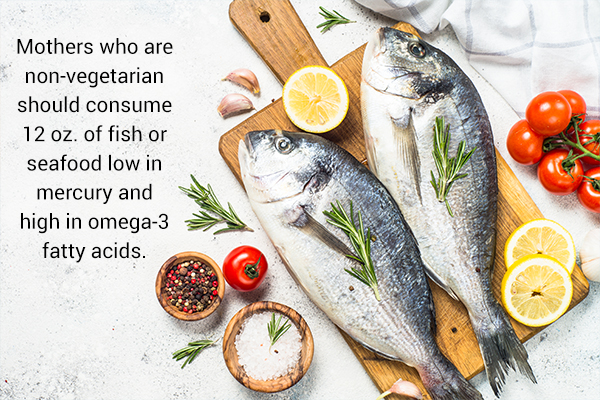
Mothers who are not vegetarian should consume 12 oz. of fish or seafood low in mercury and high in omega-3 fatty acids. Mothers who are non-vegetarian would also benefit from low-fat dairy for calcium and vitamin D.
Lean meat sources such as poultry, eggs, beef, and pork will provide healthy protein for the mother and supply additional calories needed when nursing.
Lifestyle Changes to Increase Breast Milk Production
Mothers who are breastfeeding should:
- Consume a well-balanced diet
- Perform 30 minutes of mild to moderate exercise when cleared by their provider
- Get adequate sleep
- Have a good support system in place
Can Herbs and Spices Increase Breast Milk Supply?
Some herbs have been anecdotally used for their potential to increase lactation and infant weight gain. One such popularly used plant is fennel. However, research conducted on its effects provided inconclusive results.
Since there is not enough evidence on the safety of herbal supplements, it is best that pregnant and breastfeeding women avoid their use. Moreover, two cases of nervous system damage in infants have been reported upon consumption of fennel tea by their mothers. (13)
Foods That Breastfeeding Women Should Avoid
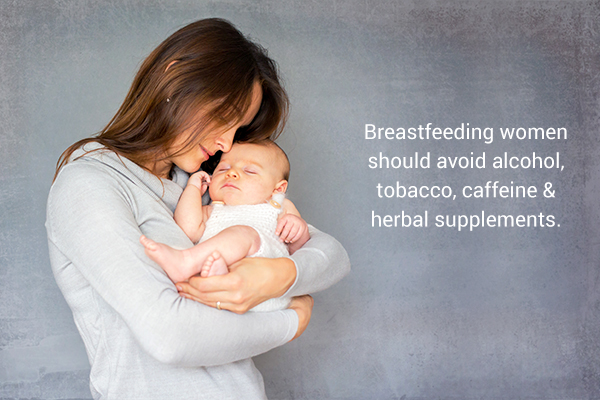
The following dietary items can dilute the nutritional value of breastmilk, dwindle its production, or can have toxic effects for the infant:
1. Alcohol
It is important to limit alcohol consumption when breastfeeding.
It has been suggested that consumption of alcohol can hinder let down and breast milk production, and overconsumption can lead to adverse effects in the mother and infant. (14) Therefore, avoid alcohol consumption at least 2 hours before nursing.
If the mother has been drinking, it is likely safer to expel milk and discard to avoid any alcohol contamination. (9)(15)
2. Tobacco
Tobacco can also have harmful effects on the infant through secondhand smoke and likely has a poor impact on milk production.
3. Caffeine
Caffeine should also be limited to no more than 2–5 cups per day. Younger infants and preterm infants have been shown to be more sensitive to caffeine. Be aware of any caffeine in supplements or medications.
4. Herbal supplements
Herbal teas, remedies, and supplements should be avoided. Always consult your physician before trying an herbal supplement. Oftentimes, there is not enough research to conclude whether the supplement is safe for a breastfeeding mother and infant.
Moreover, the flavor of various foods eaten by the mother can be transmitted into breast milk. Therefore, if you notice that your baby is bothered after you ate certain foods, stop eating them for 3 days and try again when the baby is older.
If you notice a change in stool, skin rashes, difficulty breathing, or colic post nursing, consult a pediatrician as it could be signs of a food allergy or intolerance.
Final Word
Remember that breastfeeding is a highly individualized process between the mother and infant and is dependent upon many internal and environmental factors. It does not necessarily come easy to all mothers.
Mothers who are having difficulty can consult their physician, a lactation consultant, a registered dietitian, or other support resources such as the Special Supplemental Nutrition Program for Women, Infants, and Children (WIC).
Not only will breastfeeding benefit the mother and the infant, but it can also lessen the stress from the financial burden of having to purchase formula. (2)
- Was this article helpful?
- YES, THANKS!NOT REALLY


